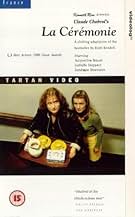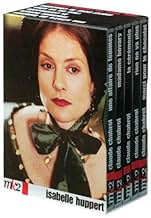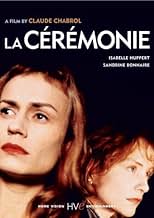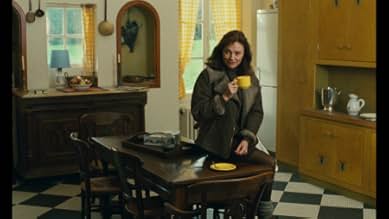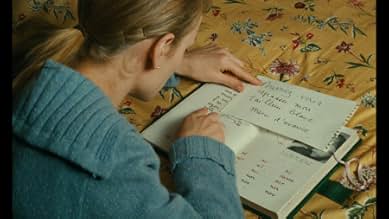IMDb-BEWERTUNG
7,5/10
14.785
IHRE BEWERTUNG
Ein neu eingestelltes Dienstmädchen für eine reiche Familie auf dem Land freundet sich mit einem Postangestellten an, der sie ermutigt, gegen ihre Arbeitgeber zu rebellieren.Ein neu eingestelltes Dienstmädchen für eine reiche Familie auf dem Land freundet sich mit einem Postangestellten an, der sie ermutigt, gegen ihre Arbeitgeber zu rebellieren.Ein neu eingestelltes Dienstmädchen für eine reiche Familie auf dem Land freundet sich mit einem Postangestellten an, der sie ermutigt, gegen ihre Arbeitgeber zu rebellieren.
- Auszeichnungen
- 9 Gewinne & 11 Nominierungen insgesamt
Empfohlene Bewertungen
I see this movie for the third time and can't prevent myself to notice the pure Claude Chabrol style in the critic of the rich people, especially in the province. But the ending is very bloody and surprising too. And in the mean time, since my last viewing, I saw PARASITES and I can't also prevent myself to see a thin line between the two features. If you have seen both features, you see what I mean. A pure delight.
The upper-class owner of a gallery Catherine Lelievre (Jacqueline Bisset) hires the efficient and quiet maid Sophie Bonhomme (Sandrine Bonnaire) for working in the family manor in the countryside of France. Her husband Georges Lelievre (Jean-Pierre Cassel), who is an opera lover, her daughter Melinda (Virginie Ledoyen) and her teenage son Gilles (Valentin Merlet) welcome Sophie and appreciate her work. Soon Sophie befriends the postmistress Jeanne (Isabelle Huppert), who is a social outcast, and she encourages Sophie to rebel against her employers, but the maid stays submissive. However, Sophie is ashamed of a secret and feels uncomfortable in many situations, finding a way to hide her secret. When Georges tells to Sophie that he does not want Jeanne in his house, Sophie stands up against him. Melinda discovers her secret and Sophie blackmails her, but Melinda tells her parents what has happened. Georges fires Sophie and she returns to the house later with Jeanne on the rampage with tragic consequences.
"La Cérémonie" is one of the best films by Claude Chabrol and it is still impressive after watching many years after the release. The poignant story of class conflict, alienation and even evilness of two outcast working-class women stays in the mind of the viewer since it might happen to anyone that has a maid at home. The unexpected violent conclusion is probably the source of inspiration for Michael Haneke's "Funny Games" (1997). It is impossible to the viewer to be not affected by the despicable and cruel behavior of the repressed Sophie and the envious Jeanne. My vote is nine.
Title (Brazil): "Mulheres Diabólicas" ("Evil Women")
Note: On 21 April 1999, I saw this film again.
Note On 08 May 2017, I saw this film again.
Note: On 08 January 2025, I saw this film again.
"La Cérémonie" is one of the best films by Claude Chabrol and it is still impressive after watching many years after the release. The poignant story of class conflict, alienation and even evilness of two outcast working-class women stays in the mind of the viewer since it might happen to anyone that has a maid at home. The unexpected violent conclusion is probably the source of inspiration for Michael Haneke's "Funny Games" (1997). It is impossible to the viewer to be not affected by the despicable and cruel behavior of the repressed Sophie and the envious Jeanne. My vote is nine.
Title (Brazil): "Mulheres Diabólicas" ("Evil Women")
Note: On 21 April 1999, I saw this film again.
Note On 08 May 2017, I saw this film again.
Note: On 08 January 2025, I saw this film again.
The performances were fine, Huppert in particular was a lot of fun to watch, but the camera direction was awful, completely chilly and remote like the worst of Haneke's work. The remove and coldness, this intentional distance leaving room for judgment from the filmmaker (and the audience) rather than more fluid and closer shots encouraging closeness and empathy, really made the whole thing lackluster, at best. Also, there were some very heavy handed and poorly drawn moments used to bash us over the head with the weight of Sophie's secret. Having not read the source material, I'll reserve my opinions on the script, but it felt to me like a completely uninspired outing and can only imagine Chabrol took the job only for the money as he seemed to never find anything that interested him in the story.
10EdgarST
I don't know much about Claude Chabrol's cinema. I've seen seven or eight of his dozens of films, but I remember them quite well, especially "Violette Nozière", "Le boucher" and "La rupture." Many years after these, "La cérémonie" is a serene work, the construction of a mature man who avoids making artificial judgments or explaining motivations of his characters, and tending traps to his audiences to keep them interested in what he's narrating. In an economic way, with well-chosen details he gives us everything needed in a story that deals with psychological disturbances and profound social disparity. I do not see this movie as a thriller nor do I see the connection with Alfred Hitchcock. While Hitchcock could almost ruin his forays into psychological landscapes (like Simon Oakland explaining Norman Bates' behavior in "Psycho" or placing clues that led to nowhere) and very rarely treated social issues, Chabrol prevents from recurring to psychological clichés and gives us subtle gestures to illustrate the "class struggle": the way the rich daughter returns the handkerchief to the post-office clerk after cleaning her filthy hands; the way the post-office clerk throws back an envelope to the bourgeois father. A few times Chabrol is not so subtle and he shows tension even between persons of the same class: the way the poor maid and the post-office clerk despise the miserly charity of an old Catholic couple, the way the rich father protests when giving his son a ride to school... Using this strategy, all the portraits are compassionate: the members of the rich family seem as pleasant as the two poor women when they share the little they have. When the climax arrives -the daughter of the bourgeois family discovers (part of) the maid's secret and, in return, the maid reveals she also knows something about the young woman- there is little else Chabrol can add, but only guide us to the conclusion. Maybe it is a much too obvious cut from the two women with no food at home, to the dinner table where the rich family finished a tasty meal. But that's all we need, in case we want an explanation of the way the two women act in the last scenes. All the elements are there for us to find answers or make interpretations if we want to do so. Not too many filmmakers today treat audiences as intelligent human beings and invite them to participate in the creative process adding the absent information, with the benefit of more than a century of cinematic tradition and –if we care- reflections on the way things are today in imbalanced societies. When "La cérémonie" was over, I was very pleased: not only did I watch a movie directed with brains, but I felt treated with respect by Claude Chabrol. Not frequent in much of today's cinema, a respectful film has great merit.
Claude Chabrol, one of the leading lights of the French New Wave, faded into a series of unimaginative throwaway flicks and obscurity (peppered with moments of worthiness such as Blood Sisters )until storming once again into the limelight with this claustrophobic psycho-thriller adaptation.
Like Heavenly Creatures and Fun this film is anchored around the destructively intense relationship between two female leads: the apparently insipid family housemaid Sophie (Sandra Bonnaire) and the sparky but cumulatively obnoxious postmistress Jeanne (Isabelle Huppert). They both, it transpires, have potentially murderous secrets in their past involving the incineration of unwanted relatives (a child and a father). After a roundabout, deliberately vague "confession" to each other they erupt into childish laughter and it seems their relationship is cemented in their mutual utter lack of remorse.
There is no guilt felt by either woman for any of their crimes be it spite, neglect, theft, opening other's mail, arson or even murder. This is because, primarily though Jeanne's obsessive class angst and Sophie's obsessive paranois, they justify their stance and actions with an "us against them the world" self-righteous fervour. Jeanne describes all her - increasingly erratic - behaviour as "a good deed" and the equaly unstable Sophie believes her.
Every role is acted impeccably by some of the leading lights of French cinema. Along with Bonnaire and Huppert, arguably the best French actresses working today, Jacqueline Bisset plays the bourgeouse lady of the house for whom Jeanne works. She sees herself as a kind and understanding employer, providing glasses and a television for her taciturn domestic. However this gesture is interpreted as patronising by the illiterate Jeanne.
It's through minot details such as this that character exposition arises . The two principals are painted with tiny, finely detailed brushstrokes while everyone around them is painted with broad strokes. This intentional disparity brings us uncomfortably closer to the unhinged worlds of Jeanne and Sophie. Worlds which are revealed slowly, subtly and manipulatively.
La Ceremonie is based of a Ruth Rendell novel, "Judgement in Stone". Rendell is an archetypal British writer and I think that if La Ceremonie was a British film with British actors and a skilful British director it would have been a very different, darker and more disturbing movie. Having said this, Chabrol, with his distinctly French sensibilities and post nouvelle vague expertise brings other qualities to the story and makes this a remarkable film. Chabrol avoided darkness for the sake of it in favour of a highly sophisticated level of characterisation and build-up. The climax, however it was filmed, could never be anything less than shocking.
Ultimately la Ceremonie presents a pessimistic view of humanity: bleak, depressing and disturbing. Even Bisset's family don't come off well with their selfishly consumereist and blinkered middle class lifestyles.This and the high degree of audience manipulation means the film leaves a bad taste in the mouth but there's no denying it's an egregious work of art.
Like Heavenly Creatures and Fun this film is anchored around the destructively intense relationship between two female leads: the apparently insipid family housemaid Sophie (Sandra Bonnaire) and the sparky but cumulatively obnoxious postmistress Jeanne (Isabelle Huppert). They both, it transpires, have potentially murderous secrets in their past involving the incineration of unwanted relatives (a child and a father). After a roundabout, deliberately vague "confession" to each other they erupt into childish laughter and it seems their relationship is cemented in their mutual utter lack of remorse.
There is no guilt felt by either woman for any of their crimes be it spite, neglect, theft, opening other's mail, arson or even murder. This is because, primarily though Jeanne's obsessive class angst and Sophie's obsessive paranois, they justify their stance and actions with an "us against them the world" self-righteous fervour. Jeanne describes all her - increasingly erratic - behaviour as "a good deed" and the equaly unstable Sophie believes her.
Every role is acted impeccably by some of the leading lights of French cinema. Along with Bonnaire and Huppert, arguably the best French actresses working today, Jacqueline Bisset plays the bourgeouse lady of the house for whom Jeanne works. She sees herself as a kind and understanding employer, providing glasses and a television for her taciturn domestic. However this gesture is interpreted as patronising by the illiterate Jeanne.
It's through minot details such as this that character exposition arises . The two principals are painted with tiny, finely detailed brushstrokes while everyone around them is painted with broad strokes. This intentional disparity brings us uncomfortably closer to the unhinged worlds of Jeanne and Sophie. Worlds which are revealed slowly, subtly and manipulatively.
La Ceremonie is based of a Ruth Rendell novel, "Judgement in Stone". Rendell is an archetypal British writer and I think that if La Ceremonie was a British film with British actors and a skilful British director it would have been a very different, darker and more disturbing movie. Having said this, Chabrol, with his distinctly French sensibilities and post nouvelle vague expertise brings other qualities to the story and makes this a remarkable film. Chabrol avoided darkness for the sake of it in favour of a highly sophisticated level of characterisation and build-up. The climax, however it was filmed, could never be anything less than shocking.
Ultimately la Ceremonie presents a pessimistic view of humanity: bleak, depressing and disturbing. Even Bisset's family don't come off well with their selfishly consumereist and blinkered middle class lifestyles.This and the high degree of audience manipulation means the film leaves a bad taste in the mouth but there's no denying it's an egregious work of art.
Wusstest du schon
- WissenswertesThe author Ruth Rendell has said that Claude Chabrol's version of her novel "A Judgement in Stone" is one of the few film adaptations of her work that she is happy with.
- Zitate
Georges Lelievre: [referring, respectively, to Sophie the illiterate maid and Jeanne the nosy postal clerk] What a pair: one can't read at all, and the other reads our mail.
- VerbindungenFeatured in Isabelle Huppert: Message personnel (2020)
- SoundtracksCello Symphony
Composed by Benjamin Britten
Top-Auswahl
Melde dich zum Bewerten an und greife auf die Watchlist für personalisierte Empfehlungen zu.
Details
- Erscheinungsdatum
- Herkunftsländer
- Offizieller Standort
- Sprache
- Auch bekannt als
- Blutiger Engel
- Drehorte
- Produktionsfirmen
- Weitere beteiligte Unternehmen bei IMDbPro anzeigen
Box Office
- Bruttoertrag in den USA und Kanada
- 873.196 $
- Weltweiter Bruttoertrag
- 873.196 $
- Laufzeit
- 1 Std. 51 Min.(111 min)
- Farbe
- Sound-Mix
- Seitenverhältnis
- 1.66 : 1
Zu dieser Seite beitragen
Bearbeitung vorschlagen oder fehlenden Inhalt hinzufügen

![Bande-annonce [OV] ansehen](https://m.media-amazon.com/images/M/MV5BNzliMDEwMzYtMjg1NS00Mjc1LTkwNDktMzc1MmJkNDJjZDIxXkEyXkFqcGdeQXRyYW5zY29kZS13b3JrZmxvdw@@._V1_QL75_UX500_CR0)
